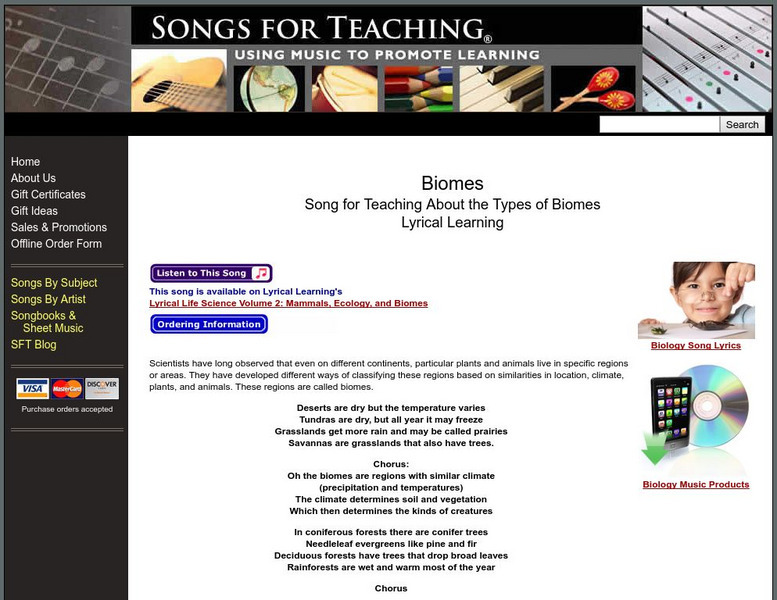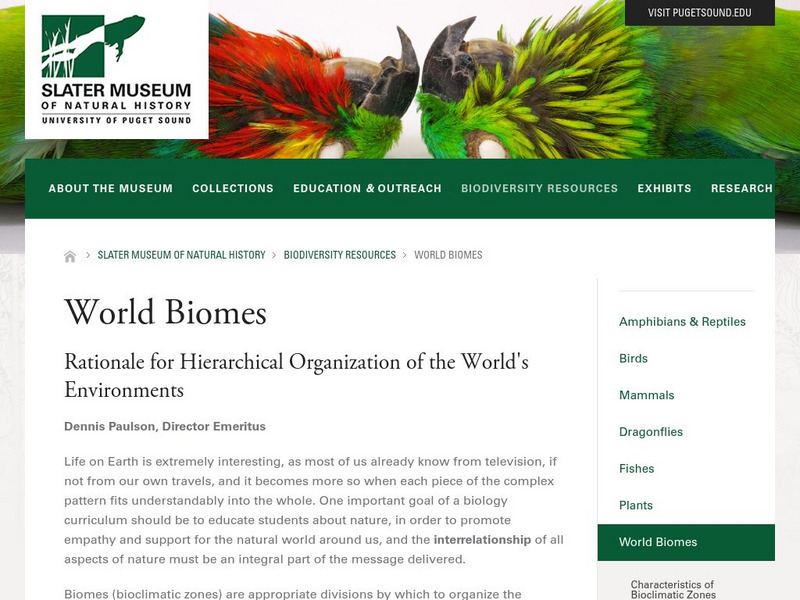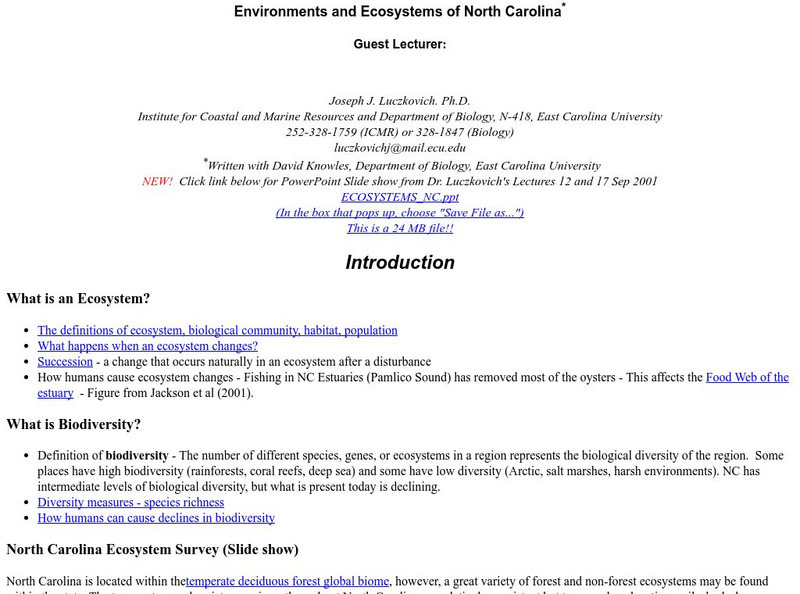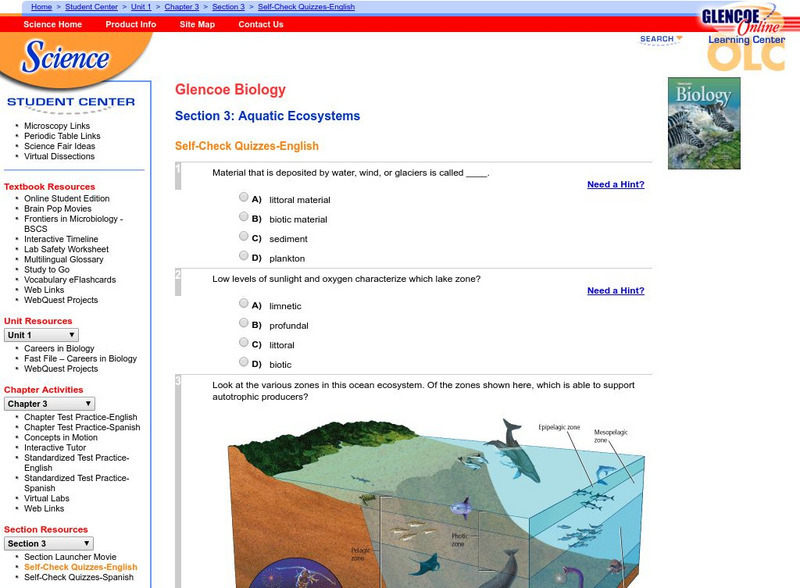Untamed Science
Untamed Science: Biology: World Biomes: Lakes and Ponds Biome
Learn about the biotic and abiotic factors of lakes and ponds as well as learning how lakes form through reading and video clips.
Ohio State University
Ohio State University: General Plant Biology: Biomes and Agriculture
An introduction to biomes and how agriculture is considered in studying large ecosystems of the world. Text is well written and easy to follow with links, charts, and pictures.
Ducksters
Ducksters: Science for Kids: Freshwater Biome
Kids learn about the freshwater aquatic biome. Ecosystems such as rivers, streams, ponds, lakes, wetlands, swamps, and bogs.
Ducksters
Ducksters: Science for Kids: Desert Biome
Kids learn about the desert biome. The dryest areas on Earth still have plant and animal life.
Other
The Ecosystems Center
A resource with educational information on ecosystems, as well as programs that focus on environmental research and education.
Songs for Teaching
Songs for Teaching: Biomes
Use this site to see how many of the animals and plants that your students can remember from each biome after listening to this song.
Songs for Teaching
Songs for Teaching: Types of Biomes
Doug Eldon performs this great song which tells about the different biomes and their characteristics. Great way to begin your unit on the biomes.
Sophia Learning
Sophia: Terrestrial Biomes: Lesson 3
This lesson will provide an understanding of the characteristics and role of terrestrial biomes, and its effect on living things. It is 3 of 3 in the series titled "Terrestrial Biomes."
Sophia Learning
Sophia: Terrestrial Biomes: Lesson 1
This lesson will provide an understanding of the characteristics and role of terrestrial biomes, and its effect on living things. It is 1 of 3 in the series titled "Terrestrial Biomes."
Other
University of Puget Sound: World Biomes
Author provides an explanation of the term Biome and the relationship of climate, soils, vegetation, diversity, adaptations, and human effects to the biome.
CK-12 Foundation
Ck 12: Life Science: Ecosystems
[Free Registration/Login may be required to access all resource tools.] Ecology is the study of ecosystems. That is, ecology is the study of how living organisms interact with each other and with the nonliving part of their environment....
PBS
Nh Pbs: Nature Works: Temperate Deciduous Forests
NatureWorks offers some fascinating information about the Temperate Deciduous Forests. Students and teachers will learn what makes these forests special, what animals live in this biome, what plants grow in this biome, and more.
Morning Earth
Biosphere as Place: Ocean: Benthic Biomes Two
study the Biology concept of ecosystems. The marine ecosystem tutorial comprises of definitions, pictures, and examples of an assortment of ocean benthic biomes.
Morning Earth
Biosphere as Place: Ocean Benthic Biomes One
Students investigate the Biology topic of ecosystems. The marine ecosystem tutorial consists of definitions, pictures, and examples of different ocean-benthic biomes.
Other
My Science Box: Ecosystem Organization
In this lesson, students will learn about the different levels in the hierarchy of ecology and explain the relationships: organism, population, community, ecosystem, biome, and biosphere. They will also discover why different regions...
Other
Environments and Ecosystems of North Carolina
North Carolina is located within the temperate deciduous forest global biome, however, a great variety of forest and non-forest ecosystems may be found within the state. The temperature and moisture regimes throughout North Carolina are...
McGraw Hill
Glencoe Biology: Terrestrial Biomes: Self Check Quiz
Try these five multiple-choice review questions over terrestrial biomes. A self-checking feature is available for students who seek further review.
Encyclopedia of Earth
Encyclopedia of Earth: Terrestrial Biome
Gives short descriptions of the many different types of biomes found on land all over the world. (Updated: February 22, 2013)
Other
College of Du Page: Energy in an Ecosystem
Ecosystems contain two kinds of commodities: matter (nutrients) and energy. Nutrients cycle through the ecosystem, available for repeated use by organisms. These cycles of use and reuse are called biogeochemical cycles. Energy instead is...
Science Education Resource Center at Carleton College
Serc: Energy Pyramids in Different Biome Locations
A research activity where young scholars research the various biotic and abiotic factors that combine to make up a biome. The end product will be the creation of a PowerPoint presentation that identifies these factors and the creation of...
US Geological Survey
Lake Pontchartrain Basin Foundation: Ecosystems in Delicate Balance
Learning activities to investigate how organisms interact in a functioning ecosystem. Students will explore the role organisms play in food chains and preserving biodiversity in ecosystems. Lake Pontchartrain Basin ecosystem is featured...
Scholastic
Scholastic: Endangered Ecosystems: Build Your Own Caterpillar
As you build your own caterpillar, make sure it has everything it needs for its survival. Learn how characteristics, like color, spines, and glands, can help protect the caterpillar.
McGraw Hill
Glencoe Biology: Aquatic Ecosystems: Self Check Quiz
Try these five multiple-choice questions about aquatic ecosystems. After answers are submitted, students can review their mistakes.
Houghton Mifflin Harcourt
Harcourt: School Publishers: Exploring Ecosystems
Compare and contrast three very different ecosystems - the Sonoran Desert in Arizona, the Florida Everglades, and the Arctic Coastal Plain in Alaska. Learn what makes each of them unique, and about the adaptations plants and animals had...




















